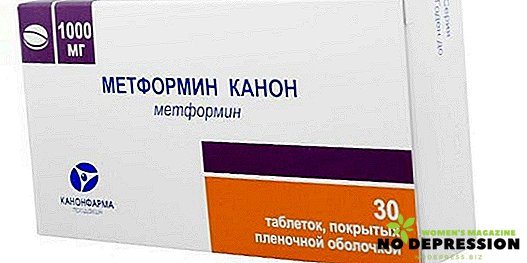Metformin is a glucose-lowering drug used to treat type 2 diabetes in people with obesity, as well as for other non-insulin-dependent diabetes.

Types of drug and composition
Metformin produces several manufacturers. Among them are Metmorphine "Richter", "Teva", "Long", "BMS", "Canon", "MV-Teva", "Zentiva". All companies provide a drug with an active substance content of 500, 850, and 1000 mg per tablet, respectively.
Each tablet consists of metmorphine in the amount of 500, 850 or 1000 mg, as well as excipients, namely: povidone K 90, corn starch, crospovidone, magnesium stearate, talc. The shell consists of methacrylic acid, methyl methacrylate copolymer or macrogol 6000, titanium dioxide and talc. Due to the difference in compositions, the shell can be either enteric or less stable.
Release form, price and terms of delivery from pharmacies
Metmorphine is available in the form of tablets with a film and enteric coating in blisters of ten pieces. Carton packs contain from one to six blisters.
Drugs from various manufacturers can be purchased at pharmacies. Metformin is released on prescription. On average, for packing 30 pieces of tablets of 500, 850 and 1000 mg you will need to pay about 80, 100 and 120 rubles, respectively. Depending on the manufacturer, this figure may vary.
Indications and contraindications to the use of the drug
Metformin is used in diabetes mellitus of the insulin-independent form in the elderly, as well as in people suffering from obesity, and in the insulin-dependent form in conjunction with taking insulin. In addition, the possibility of prescribing Metformin for gestational diabetes mellitus, which occurs in some women on the background of hyperglycemia during pregnancy, as well as in polycystic ovary syndrome, is being investigated.
The drug is contraindicated in:
- diabetic coma and precoma;

- hypoglycemia;
- keto and lactate acidosis;
- acute renal failure;
- chronic liver disease;
- myocardial infarction; pre- and postoperative period;
- lactataciosis;
- with a strict diet with no more than 1000 kcal per day;
- as well as during the first two trimesters of pregnancy and during breastfeeding.
Also, the drug is contraindicated in any conditions and diseases that contribute to the development of lactic acidosis. This group includes kidney diseases, liver and lung diseases, and alcoholism.
Various forms of heart failure have also previously been considered to be provoking lactic acidosis when using Metaformin, however, due to the fact that it is the safest for this group of people, compared to other drugs, made it the only possible choice.
Before radiographic studies using iodine in the form of a contrast agent, it is necessary to stop taking the drug for a couple of days due to reduced kidney function and possible development of lactic acidosis. Persons over 60 years of age who are constantly subjected to heavy physical exertion should take the drug with caution for the same reasons.
Instructions for use of the drug
 Depending on the form of release, tablets are taken in different dosages. It is important to carry out a medical prescription, which will be prescribed the time of admission, the frequency per day, the number of tablets. The drug is taken orally with food or immediately after a meal.
Depending on the form of release, tablets are taken in different dosages. It is important to carry out a medical prescription, which will be prescribed the time of admission, the frequency per day, the number of tablets. The drug is taken orally with food or immediately after a meal.
Dibetics that do not take insulin, take 1 g of metformin twice a day or 500 mg three times a day for the first three days of administration. From 4 to 14 days, 1 g is taken three times a day, after which a blood and urine analysis for glucose is done and a reduction adjustment can be made. To support further take 1-2 g of metformin per day.
Long-acting tablets of 850 mg of metformin are taken twice a day after breakfast and dinner. The maximum daily take 3 g. When taken simultaneously with unsulin up to 40 units / day, metformin is taken according to the same scheme, but the insulin dose is reduced, reducing to a minimum.
Side effects and drug overdose
With the right approach to taking the drug, most side effects can be minimized. To reduce the negative impact, it is necessary to carefully monitor the changes that occur in the body, and consult with your doctor about possible adjustments.
 Metformin affects the gastrointestinal tract, causing disruption in its functioning. In this regard, symptoms such as emetic urge and vomiting, diarrhea, flatulence, loss of appetite, pain in the stomach, and an unpleasant taste in the mouth may occur. In addition, respiratory function disorders, tachycardia, skin rashes, peeling and itching of the skin are possible.
Metformin affects the gastrointestinal tract, causing disruption in its functioning. In this regard, symptoms such as emetic urge and vomiting, diarrhea, flatulence, loss of appetite, pain in the stomach, and an unpleasant taste in the mouth may occur. In addition, respiratory function disorders, tachycardia, skin rashes, peeling and itching of the skin are possible.
With the diseases listed in the "contraindications" section, lactic acidosis, a disease associated with the penetration of lactic acid into the blood, may develop. In lactic acidosis, the first signs are the occurrence of weakness, drowsiness, increased fatigue, nausea and vomiting.
Long-term use in this case can cause disruption to the liver. If you suspect lactic acidosis, you should immediately consult a doctor, informing him that Metformin is taken.
With an overdose of the drug, which may already occur when taking more than 5 g, there is nausea, vomiting, diarrhea, abdominal pain. Hypoglycemia and hyperglycemia are sometimes observed.
The most dangerous drug overdose is lactic acidosis. With the manifestation of his symptoms, the patient urgently needs to be hospitalized.
Doctors do the washing with sodium bicarbonate and carry out other necessary procedures.
Using Metformin for weight loss
When used in diabetic patients with obesity, it was observed that Metformin also leads to weight loss. However, this drug can lead to serious complications, so it can be taken only on prescription. In addition, Metformin itself does not burn body fat, but only contributes to the launch of the process of their spending.
 The drug is accompanied by a special diet that eliminates or minimizes the use of sweet, flour, starch-containing foods and alcohol. Food is developed by the attending physician, it should not lead to starvation, and also accompanied by abundant drinking.
The drug is accompanied by a special diet that eliminates or minimizes the use of sweet, flour, starch-containing foods and alcohol. Food is developed by the attending physician, it should not lead to starvation, and also accompanied by abundant drinking.
In combination with the drug intake, physical exercise is performed. In any case, Metformin will not help in losing weight without the patient's reciprocal efforts. The reception cycle should last no more than six months.
The effect of the drug on excess weight is due to a decrease in hunger, acceleration of glucose absorption by muscle tissue, less absorption of carbohydrates, and fat oxidation.
Reception can be appointed only after a thorough examination of the body in order to accurately establish the balance of harm and benefit. In the presence of contraindications to receive Metformin can not be used for weight loss.
Compatibility with other drugs
Metformin in the treatment of diabetes has a serious effect on the kidneys, and can also lead to hypoglycemia, especially when taken together with insulin and similar substances that increase its effect. Therefore, it is important to pay particular attention to which drugs are used simultaneously with metformin.
The hypoglycemic effect of metaformin enhances not only insulin. Strengthening of the drug is observed when taken together with:
- sulfonylurea derivatives;
- acarbose;
- nonsteroidal anti-inflammatory drugs;
- onamino oxidase inhibitors — antidepressants;

- oxytetracycline;
- angiotensin converting enzyme inhibitors;
- clofibrate derivatives;
- cyclophosphamide;
- β-blocker;
The effectiveness of metformin is reduced when taken simultaneously with:
- diuretics;
- corticosteroids;
- samostanin analogues;
- thyroid hormones;
- phenytoin;
- glucagon;
- thyroid hormones;
- estrogen, even entering into oral contraceptives;
- nicotinic acid;
- sympathomimetics;
- calcium antagonists;
- isoniazid.
Reviews of patients taking this drug
When used in the treatment of diabetes, Metformin has shown high efficacy.
Because of diabetes, I became very fat, I constantly wanted to eat, therefore, I often began to look in the refrigerator. Thanks to the intake of metformin, I felt much better and even lost several kilograms. Sugar dropped, appetite stopped being so brutal. Definitely recommend this drug for diabetes.
Vladimir, 35 years old, Moscow
The doctor prescribed this drug for me to treat polycystic ovary. I spent on drink the necessary course, it seems, there were no particular complications, although, at the beginning, there was indigestion and gas. But this is nonsense, because having suffered these temporary troubles, I put my ovaries in order.
Tatyana, 41, Stavropol
Diabetes has been suffering for over 15 years. Now I take metformin, and insulin I prick in the lowered dosage. I can not say that sugar has decreased, but the appetite has become much lower. The state of health on this background has improved.
Galina, 52 years old, St. Petersburg
Additional information about this drug is in the next video.














